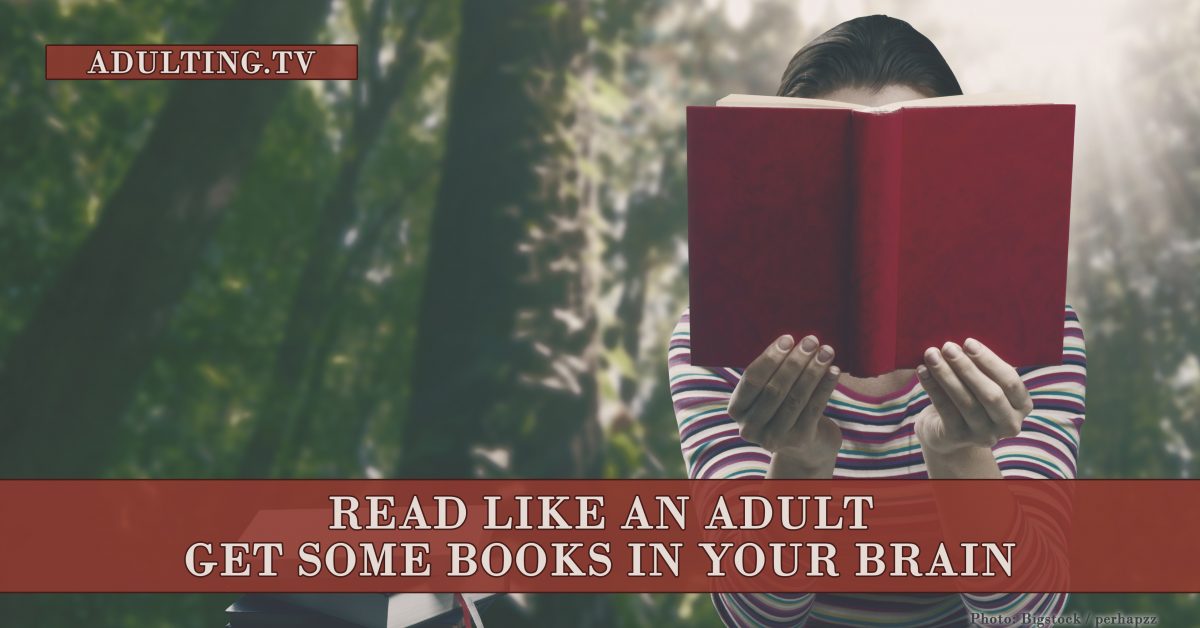Remember being assigned reading lists in high school? Assuming you did your homework, that might have been the last time you took the time to read a real book. Or any book. Or anything beyond a social media post.
You’re not alone if that’s true. After all, we’re getting busier and busier with family, work, and other obligations, and reading for fun or pleasure gets pushed farther and farther down the priority list.
But that’s not an excuse to feel better about it. Even if you’re not an avid reader like I am, you should still be reading books (or blog posts or magazines or newspapers or anything, really).
Why?
Because what we gain from reading is limitless. Reading gives you some place to go when you’re stuck at home, it helps pass the time in boring situations, it’s a cheap hobby, there’s a book for everyone, and they can change your thinking. That’s just the beginning, too.
Reading reduces stress. If you spend your day working hard, a relaxing book or entertaining graphic novel could be what you need at the end of the day to wind down.
Reading improves vocabulary. A more diverse and nuanced vocabulary makes you a better communicator, and that advantage has a positive effect on all aspects of life as an adult.
Reading increases empathy. Books can expose you to ideas and cultures you may not experience day-to-day. Being able to see life from other perspectives strengthens your emotional intelligence.
Reading expands knowledge. Ideas are best expressed through writing, and even with video and blogs, written words in the form of books continue to be the best way to spread knowledge.
Reading improves writing and comprehension skills. Effective writing is a crucial skill, and you can easily find examples of poor writing. Just look at any meme on Facebook. As your writing skills improve, you’ll stand out more and make better impressions when it’s important to do so.
Reading sharpens your memory. As you read, you’re giving your brain a work-out, the kind of exercise it needs to stay healthy and sharp. Reading is harder work for your mind than just watching a movie, and a lifetime of reading leads to a complex mind with strong comprehension and retention.
Now you’re probably saying, “Jana, you’ve sold me. I really should read more. But it’s just so hard to find time or motivation to read a book — or anything printed with words. How can I do it?” Well, you’re in luck because it’s a lot easier than you think and you definitely have more time to read than you think you do.
Here are some tips.
Read intentionally.
Define your purpose for reading. What exactly are you trying to accomplish? What do you want to learn? Are you reading to relax? Once you know why you are reading, you can focus, find the appropriate material that will engage you and keep you interested, and you’ll find yourself wanting to read.
Schedule a reading appointment.
Yes, it’s hard to find time in the day to read. Which is why you need to make the time. What’s the difference between the two? When you say you need to find the time, it’s easy to push it off with other tasks that are more or less important. When you make the time, you schedule it in like you would a conference call or a doctor’s appointment.
One is a choice, the other is set task. Although I’m not a fan of looking at reading as a task or to-do list item, if you’re finding it hard to fit reading into your day, this is a way to do it until it becomes habit. And it doesn’t have to be a long block of time. Fifteen minutes in the morning or before bed is enough to get through one book a month.
Set reading goals.
I don’t mean the arbitrary “I’m going to read 50 books this year” type of goal. Set small, reasonable goals like “I’m going to read 20 pages every day” or “I’m going to read The 7 Habits of Highly Effective People this year” or “I’m going to join my favorite blogger’s book launch team to ensure I read the book before I write about it.” Setting these small goals not only makes you read every day but it keeps with the theme of reading intentionally. And if you’re goal oriented, it’s another incentive to get that book read.
Get a library card.
Books are expensive, even if you’re using daily deal sites, and if you get in the mindset that you can only read if you buy books, then it’s definitely easy to not read. So why not get a library card? It’s free, it’s easy, and interlibrary loans are a gift from the book gods. Even if you live in an area with a poor selection of books or it’s difficult to get to the library, apps like Overdrive make it easy to borrow eBooks. If you don’t have a tablet or Kindle but you have a smartphone, you can download the Overdrive app or the Kindle app onto your phone and use that to read the books as well. And Flipster is a great way to borrow magazines from your library.
Read a variety.
It’s easy to quit on reading if you’re sticking to one topic. You get bored and you just can’t read one more business or self-improvement book. So don’t. Instead of nonfiction, read a fiction book. Sick of historical fiction? Read a young adult book. Liked comic books as a kid? Read a graphic novel.
Reading the same kind of books on repeat is like eating the same breakfast every day for a year. You know you like it, you know it’s simple to plan, but after awhile, you just can’t choke it down anymore so you maybe stop eating it altogether.
Don’t let your reading habit fall into that pattern. It’s supposed to be fun and if it starts to feel like a boring chore, it’s time to change it up.
In the song “Big Casino” by Jimmy Eat World, they sing “There’s lots of smart ideas in books I never read. When the girls come talk to me I wish to hell I had.”
Don’t let that be you. Start with one from this list of influential books.






